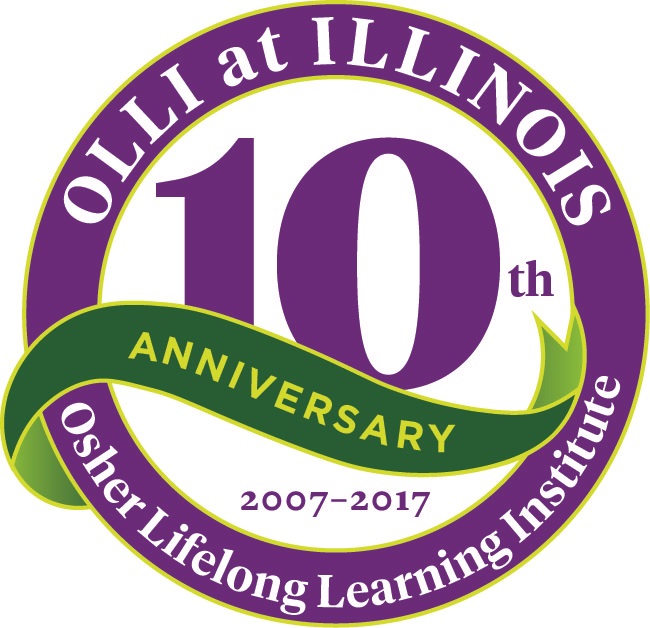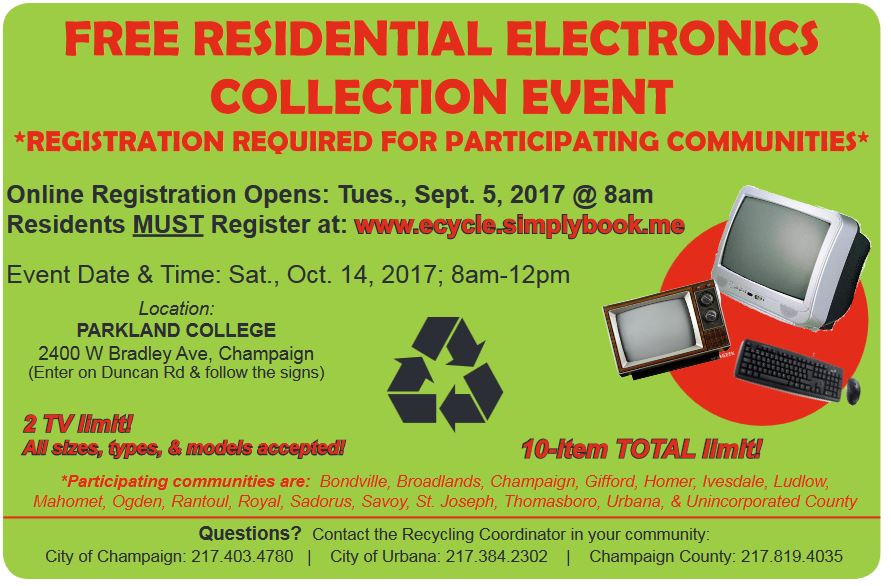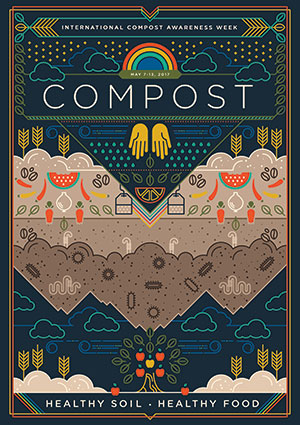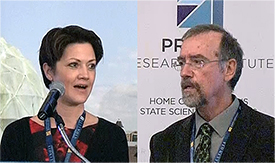Beginning September 13, Joy Scrogum, ISTC sustainability specialist and technical assistance program team member, will teach “Reuse as a Sustainability Strategy” at the Osher Lifelong Learning Institute (OLLI) at Illinois. Spaces remain available, so sign up today! The 8-week course meets through November 1.
Course overview: When thinking about how to decrease their own “carbon footprint,” or to improve the overall sustainability of our society, many people typically consider strategies involving reduction of consumption or resource use, or increased recycling and use of recycled materials. This course will focus on the often overlooked “third R,” reuse, and why it is an important component of sustainability. Students will be introduced to sustainability, the waste management hierarchy, and the circular economy. The course will explore different forms of reuse (e.g. repair, food recovery, etc.), and their economic, environmental, and social impacts. During the final session we’ll spend some time reflecting on the concepts covered throughout the course and students will brainstorm ideas for how they might apply those concepts to their own lives and/or communities—e.g. in day-to-day lifestyle choices, as part of their business or a volunteer effort, or in congregations or other groups in which they may participate. In other words, we’ll consider how you might take what you’ve learned and use it to be a force for positive change, or more broadly, how these concepts might be applied in the Champaign-Urbana area to make it a more sustainable place for all inhabitants.
Each 90-minute session will include lecture/discussion with roughly the last 20-30 minutes dedicated to questions and in-depth discussion. Course materials, including suggested readings and PDF versions of lecture slides, are made available to participants to download from a course web site. There are no assignments or grades–just learning for sake of learning.
Course outline:
- Week 1 (Sept. 13): Sustainability and Circularity. An introduction to sustainability, the waste management hierarchy, and the circular economy. We’ll explore the differences between reuse and recycling, the environmental impacts of reuse (beyond solid waste reduction), as well as related concepts and terms, such as “zero waste,” “cradle to cradle,” “biomimicry,” etc.
- Week 2 (Sept. 20): Design Paradigms: Durability vs. Disposability. An exploration of the origins of planned obsolescence, as well as related concepts like technological and perceived obsolescence, and what it all means in terms of the way we interact with products, both from the consumer and designer perspectives. We’ll look at examples of how some products are being designed with reuse and materials reclamation in mind.
- Week 3 (Sept. 27): Repair is Noble. This tag line is used by the repair-oriented company iFixit to convey how repair is tied to values such as freedom, respect, and conservation. We’ll discuss the extension of the product life cycle through repair, and how that not only reduces solid waste generation, but also consumption of “embodied” resources. Case studies of projects tied to fostering repair will illustrate economic and social benefits through community building and making technology accessible to more people. The “Right to Repair” movement will be outlined, including relevant legislation (proposed or on the books) in various states, including IL. Related concepts, such as refurbishment and remanufacturing, will be defined.
- Week 4 (Oct. 4): Feeding People, Not Landfills. An exploration of food recovery as an important strategy to fight food waste as well as hunger and poverty. The magnitude of food waste both nationally and globally will be conveyed. Opportunities for innovation and entrepreneurship, relevant policy, and challenges related to infrastructure and logistics will be discussed.
- Week 5 (Oct.11): Secondhand Solutions. We’ll examine enterprises and organizations that contribute to our economy and culture by making commodities out of reused and reclaimed goods. Materials for the Arts, thrift stores, and reclaimed building and home décor warehouses will be presented as familiar examples, along with virtual examples, and tools for connecting individuals for the purposes of exchanging or sharing goods and surplus.
- Week 6 (Oct.18): Finding Your Repurpose. An analysis of repurposing—reusing or redeploying products or objects with one original use value for an alternative use value. The “beneficial reuse” of buildings, products, vehicles, and materials will be examined, along with the reuse art movement.
- Week 7 (Oct. 25): Repackaged: Packaging with Reuse in Mind. A survey of packaging waste issues and impacts along with opportunities for change through creative design. Examples of retailers, restaurants, and manufacturers employing reusable packaging strategies will be highlighted.
- Week 8 (Nov. 1): Full Circle: Summary and Applications Brainstorming. A review of points about environmental, economic, and social impacts of reuse which were touched upon throughout the course, including potential negative impacts as well as positive ones. We’ll delve into ideas for how the strategies discussed are and might be applied in our community, organizations, businesses, policies, personal lives, etc. How might you reuse the information and inspiration gleaned from this course to be a force for positive change?
OLLI is a member-centered community of adult learners that is supported by the Bernard Osher Foundation, the Illinois Office of the Provost, and the generous donations of OLLI members and community partners. It is part of a network of 120 OLLI programs across the United States, and there are over 160,000 members nationwide. OLLI offers fall and spring semesters of 8-week courses taught by distinguished faculty (both current and emeritus) from the University of Illinois and other regional colleges and universities, and community members from a wide variety of areas. A selection of 4-week courses is also offered. The fall 2017 semester begins Monday, September 11th.
To sign up for an OLLI course, a community member must first sign up for an OLLI membership. You must be 50 or older to join OLLI. Your OLLI membership includes one free course per year; additional 8-week courses are $40 each, and 4-week courses are $20 each. Annual membership for an individual or the first member of a household membership, active from July 1, 2017, through June 30, 2018, costs $180. Adding a second member in your household costs $155. Current course offerings are listed at http://olli.illinois.edu/courses/current.html.
You may register for any course, including the Reuse as a Sustainability Strategy course, at any time, right up until the course begins. Register online at https://reg138.imperisoft.com/OlliIllinois/Search/Registration.aspx. If you are not yet an OLLI member, look for the “New user?” link in the log in box at this URL to become a member and obtain a user name and password to sign up for courses. Full registration instructions are available at
http://olli.illinois.edu/downloads/documents/Online%20Registration%20Instructions.pdf.










 Food service company
Food service company 